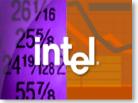|
Intel, FTC reach agreement
|
 |
March 8, 1999: 3:40 p.m. ET
Proposal needs full commission OK; agreement propels chip-maker's stock
|
WASHINGTON (CNNfn) - Intel Corp. and the Federal Trade Commission at the very least delayed an antitrust showdown Monday with the tentative settlement of a suit involving the company's dominance of the semiconductor industry.
The agreement was seen as good news to investors, who pushed Intel shares up 4-3/16 to 118-13/16 in Monday afternoon trading.
Terms of the agreement weren't immediately disclosed pending approval by the full FTC, but Intel President Craig Barrett called the settlement a "win-win for both parties."
"This is acceptable to both parties and was the result of constructive dialog between Intel and the FTC," Barrett said.
Full commission's approval needed
A joint motion to withdraw the case, which was scheduled to be heard by an FTC administrative judge beginning Tuesday, was granted by the commission's secretary. This allows the full commission time to consider the settlement, which was reached over the weekend between the company and the commission's Complaint Counsel.
"If approved by the commission, the proposed settlement being recommended by Complaint Counsel and Intel would resolve the allegations contained in the commission's complaint issued on June 8," said William Baer, director of the FTC's Bureau of Competition.
The FTC said the full commission can either accept the settlement, reject it and return it to litigation, or take any other action it deems appropriate. The agreement won't be placed on the public record unless or until it is accepted by the full commission.
But the agreement didn't put the antitrust matter to rest completely.
"There are remaining issues under investigation by the commission," Baer said. "The commission's staff is committed to working expeditiously to resolve those concerns."
Intergraph sees vindication
The FTC had accused Intel (INTC) of using its size to maintain a stranglehold on the market for microprocessors. The company rejected the charges, saying it doesn't have a monopoly and didn't seek to crush competition when disputes arose with three computer and computer-products makers.
Among those companies is engineering computer and software maker Intergraph (INGR), which has filed a private suit against Intel over what it claims is coercive behavior, patent infringement and antitrust violations by the chip maker. Under a preliminary injunction issued last April, Intel is compelled to provide products and services to Intergraph pending the trial on Intergraph's charges scheduled to begin in February 2000.
"While we have not seen the precise relief the FTC obtained in the decree, this settlement vindicates our antitrust claims and shows that the preliminary injunction in favor of Intergraph granted by Judge (Edwin) Nelson in the federal court of Alabama was based on sound antitrust principles," Intergraph said.
"We will continue to pursue our private lawsuit against Intel, which is a much broader case," the company said.
"We don't see any impact," said Intel spokesman Chuck Mulloy of the Intergraph case as it relates to the FTC settlement. "We are busily preparing for trial."
Settlement talks pursued for weeks
An Intel source said both parties saw there were areas of agreement during preparation for the administrative trial. Talks between the parties accelerated for about three weeks, with Barrett checking off on the proposed settlement Sunday night.
"Intel has been driving prices down consistently across the product spectrum. Also, if you look at it, they've been the quality leaders, they've been the innovators," David Alger, portfolio manager for Fred Alger Management and a holder of Intel stock, told CNNfn Monday. "I don't think there's much of a case for Intel being a monopolist in that sense."
The Intel/FTC dispute differed from the proceeding involving Microsoft (MSFT), which is now in recess. That case, before a federal district court judge, was brought by the Justice Department and several states, and has been far more rancorous. Antitrust lawyers said it was easier for Intel and the FTC to reach a settlement because the charges in that case were more narrowly drawn.
"There were problems with it (the case) as a matter of legal theory," Michael Malina, chairman of the New York State Bar Association's Antitrust Section told CNNfn. "It was not a slam dunk by any means."
"Pending what the decree ultimately says, I am not at all surprised that the FTC takes a bird in the hand," Malina added.
AMD, Cyrix challenge dominance
Intel's dominance of the market has actually eroded in recent years as chip makers such as Advanced Micro Devices (AMD) and National Semiconductor's (NSM) Cyrix unit began providing processors for computers priced below $1,000.
"Intel has a bigger problem with AMD than it has with the federal government," said A.A. LaFountain III, an analyst with Needham & Co. "This might free up some of management's attention to deal with the competitive challenge."
LaFountain said his opinion differs from a lot of other industry analysts in being more positive about AMD, particularly as it begins to attack the server and workstation market, than he is about Intel.
"We think that Intel has an awful lot to lose in the microprocessor area," LaFountain said. "It's obviously one of the greatest enterprises ever put together, but from that lofty perch it's really hard to move up, and it's a heck of a lot easier to move down."
For a chart of Intel's intraday stock performance, click here

|
|
|
|
|
 |

|

